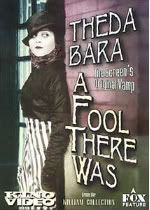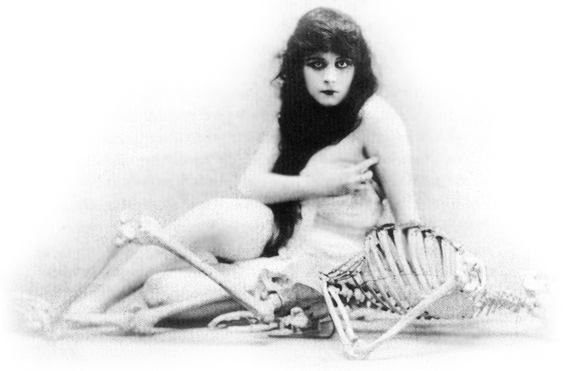
1915 United States B&W/tinted 67 Min.
Directed by Frank Powell
From the cover:
Widely regarded as the screen’s first true sex symbol – a leading actress whose charm was built not upon quaint innocence but carnal desire – Theda Bara revolutionized the adolescent art of cinematic sensuality. One of the very few Bara films that exist today, A FOOL THERE WAS catapulted the actress to stardom in 1915 and introduced the term “vamp” (both as a noun “and” as a verb) to the American pop culture vocabulary.
Bara plays “Vampire,” a cunning woman who uses her irresistible charms to seduce and abandon a series of influential men. When one lover commits suicide on the deck of a luxury liner, she merely turns her gaze to another passenger, John Schuyler (Edward José), and leads him down a path to moral degradation and public scorn. Schuyler’s wife (Mabel Frenyear) never gives up hope for her husband’s redemption but has severely underestimated the hypnotic power the Vampire has upon her victims.
One of the most remarkable aspects of A FOOL THERE WAS is its uncompromising ending. Rather than offering a syrupy resolution of eleventh-hour moral enlightenment, the film allows its characters to follow their downward trajectories toward less edifying fates.
Special Features:
-- Complete text of Rudyard Kipling’s poem “The Vampire.”
-- Scrapbook of photographs and text.
. . . . . . . . . . . . . . .
I could not find anything in the forum but the briefest of references to this film and its star. Given that the film was somewhat of a sensation in its time, and given that Theda Bara made quite an impact upon the way women could be portrayed on film, I thought it would be interesting to create a dedicated thread.
William Fox and Frank Powell selected Theda (at the time a relatively unsuccessful stage actress with only one bit part in films to her credit) to play the central role of the “vamp” in the film. They created a clever publicity stunt around her origins that fired the imagination of the public: she was introduced as the love child of a French artist and his Arab mistress, born on the sandy floor of the Sahara desert, her name being anagrams for “death” and “arab.” All of it was a fabrication, but it served to build up the image of Theda as a man-eater, vampire, femme fatale, before the film had even premiered.
When the film did open, it was a success with the public (if not with the critics), who was unaccustomed to seeing the kind of complex and sexually motivated character that Theda portrayed. And, it is a portrayal that even today is chilling. Theda comes across as a vicious predator of men, hungry for their money, and willing to go to any length to maintain her luxurious lifestyle. With eyes hardened by layers of mascara, her gaze appears to spellbind men, and her body language is at turns amphibian and feline. The men that she preys on are reduced to wizened cripples, ruined and dependent on her sex, and/or alcohol. Early on, we see one of her former “lovers” reduced to vagrancy, while another takes his own life with a gunshot to his head.
The lawyer, who falls under Theda’s gaze in the film, and whose downward spiral the story follows to its logical conclusion, is at the film’s beginning affluent and successful in his career; he is in his early forties, and happily married with a lovely adolescent daughter. His decline over the course of the rest of the film is superbly realized, displaying his entanglement in Theda’s web as a physical process. Although the story does not span more than a year or two, his hair gradually turns white, his face becomes puffy, and he initially gains weight, only to later wither and almost literally crumble away. This physical change is of course partly rationalized by his descent into alcoholism, but the physical impact is escalated, and there are moments toward the end of the film, where the atmosphere becomes positively gothic, and it is not far from turning into a true horror picture. The part of John Scuyler, Theda’s prey, is played by Edward Jose, an almost completely unknown Belgian actor, whose career apparently did not take off after the film.
As “cinema,” A Fool There Was stays fairly close to the mold of the narrative film of the time. The story is told in medium to long shots, without close-ups, and without movement of the camera. However, occasionally there is an interesting shot or sequence, as, for example, early in the film, when a sequence depicting the idyll of the Scuylers domestic life comes to a close. The family is seen on a beach, watching the sun set, and the waves are seen rolling away from the beach into the horizon. A title card announces to the audience: “The sunset of their happiness.” Of further note is the use of light, or the absence thereof, as the film progresses. In the later stages of the film, John is increasingly seen isolated in darkness, living behind closed drapes, and Theda emerges from the shadows at intervals to inject her poison into him. Some scenes even appear underlit (although it could simply be the age and condition of the print).
The film is of course one of the very few surviving films of Theda Bara’s short but cometic career. In the context of the time in which it was made, it is fascinating to see how the film expressed the idea of “the vamp.” This is not the first tentative step toward a more aggressive type of female persona on film, it is rather the fully fledged archetype of the “femme fatale” presented to the world, and at once taken to its extreme. All in all a very interesting and entertaining film.
Kino released the film on DVD a few years ago. The transfer is based on a restoration from the mid-‘80s, and the print displays some light damage in places, but nothing very distracting.
Some stills from the DVD are located in the screen captures thread.
